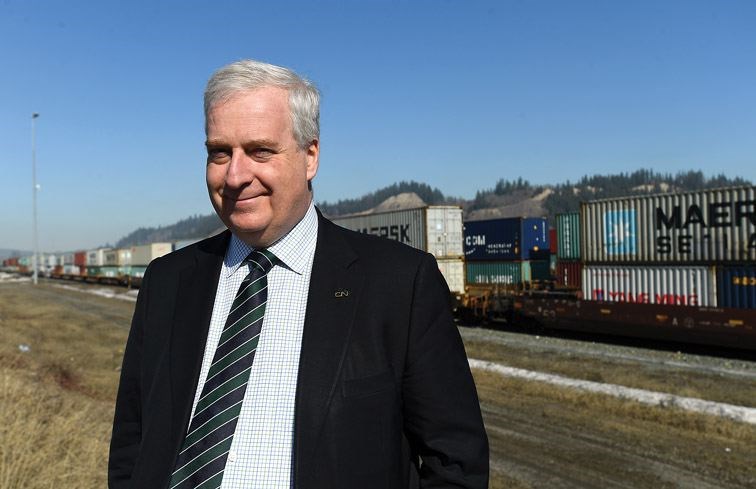CN Rail is investing big money in the Prince George area this construction season.
The national railway's vice-president of corporate services and chief legal officer Sean Finn was in the city last week for a trio of duties.
The first was to apologize to the region's wood manufacturers for an unprecedented backlog that has delayed big-ticket products like lumber, pulp chips and bioenergy pellets from getting to market.
Secondly, he was on a fact-finding mission to find out how those factories and mills could be better served in a revamped CN Rail shipping model, since the company was injecting billions of dollars into restoring viability to its service.
Thirdly, a substantial amount of that money was set for this region. Finn said that $100 million would be invested between Prince George and Prince Rupert this year.
"We're going to be making longer sidings, so double-tracking, between Prince Rupert and Prince George," he said. "We are digging as we speak now. We're clearing bush, we're surveying the property. We won't double the track the whole way, but we will add sidings and if we have two sidings close by we will connect them and make a passing track."
The point of the work, like the similar efforts all across Western Canada, is to get trains moving through their overall network more speedily.
The backlog was caused, he said, by poor estimating of the freight volumes they would be called upon to move this year and having too few locomotives and too few crews for the big volumes.
It came to a head when the nation's grain harvest came due, and there was no way for the train company to get the core export (and critical food supply overseas) from the Prairies to the ports.
When a focus was placed on this major part of Canada's Gross Domestic Product (not to mention a perishable item) the domino effect caused the forest products of northern B.C. to be the next commodities to stand still.
A key issue for the local companies was potentially missing their deadlines, through no fault of their own, with the customers waiting for their orders of wood.
Another key issue is that all wood products, like grain, are also perishable. If wood chips or lumber sit too long in their piles, especially in a spring freshet, they will suffer damage.
"We've got lumber on the ground with our customers. We've got pulp on the ground. These plants and mills keep on producing," Finn said.
"At Sinclar (the ownership company of wood manufacturing facilities like Lakeland Mills) I could see firsthand the issues they are having, not having cars getting to their mill. We are very focused on it."
There are currently no bottlenecks on the B.C. track system, said Finn, but what's holding up the wood shipments most is a lack of the train cars built especially to move lumber. It can take up to 30 days to get them back from the U.S. companies they transfer them too for stateside transportation, and they can get stuck in long lineups at certain port facilities.
Finn said he was urging grain producers to use the shipping facilities in Prince Rupert and Thunder Bay specifically to help ease these lineups, most notably in Vancouver.
There was a fourth topic Finn was in Prince George to personally oversee. A job fair was held at Kopar Administration and CN Rail was one of the featured companies accepting resumes. Finn said hundreds of new train personnel needed to be hired and about 60 new conductors would be stationed in Prince George.
For anyone interested in a career that requires no university degree, pays a strong wage and provides in-house training, apply on the CN Rail website.



